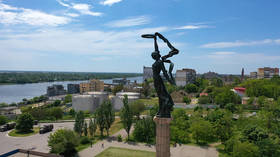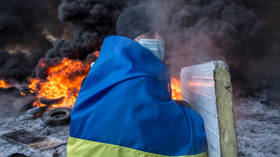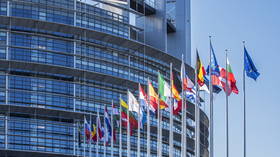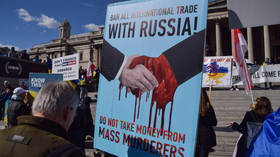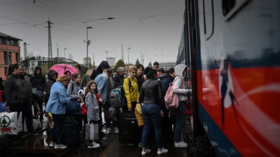With attempts to 'cancel' Pushkin, Ukraine's drive to eradicate Russian language and culture has reached the level of farce
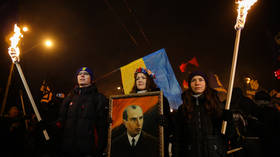
The first attempts to divide Ukrainian citizens into ‘natives’ and ‘outsiders’ began almost immediately after the country gained independence in 1991, and have continued with varying degrees of intensity to this day.
However, since the Western-backed 2014 Maidan coup, which overthrew the elected government and split the country, these efforts have acquired a truly all-encompassing scale with a clearly anti-Russian orientation.
Over recent years, the Russian language issue played a specific role – with a ban on using the tongue in various settings, from the media and education to government agencies. Now, the Ukrainian authorities have begun to demolish monuments to Russian cultural and political figures, as well as renaming streets and squares named after them.
What consequences can the next wave of de-Russification of Ukraine have, and how capable is Russia of influencing this situation during its ongoing military offensive?
Repudiating Russian
The course towards Ukrainization was taken, with some reservations, immediately after the country gained independence in 1991. The first long-term programs aimed at inducing educational institutions and the media to use the official state language appeared in the 90s. “Ukrainization is the restoration of justice,” the country’s second president, Leonid Kuchma, wrote in his landmark book, "Ukraine is not Russia."
But at that time, the Russian and Russian-speaking population was still able to create political movements, operate cultural centers, and use its native language in the public sphere. This balance was finally broken after the events of 2014, when the struggle against everything linked to Moscow became a symbol of the development of a new statehood.
From then on, Russians were given the choice of either completely abandoning their identity, becoming Ukrainians, and learning a foreign language in their native land, or remaining a national group without full rights. This is despite the provisions of Article 10 of the Ukrainian Constitution, which guarantees the free promotion and use of the Russian language.
In the period from 2020 to 2022, a number of acts were adopted at different levels to implement the policy of Ukrainization:
- The law On Ensuring the Functioning of the Ukrainian Language as the Official State Language provided for shifting the entire film industry, information sphere, service sector, and government administration into Ukrainian.
- The law On Full General Secondary Education eliminated all Russian-speaking schools in the country as of September 1, 2020
- The law On Indigenous Peoples excluded the possibility of granting broad cultural, economic, educational, and linguistic rights to Russians.
- A government program for developing the functionality of the Ukrainian language calls for the adoption of the official state language in all spheres of public life by 2030.
At the same time, statistics from recent years have shown that Ukraine has made little progress in this regard, remaining a solidly bilingual state. Data from Google, which contradicts the statistics released by the Ukrainian government, has revealed that most of its Ukrainian users use Russian. Moreover, a survey, conducted by the Kiev International Institute of Sociology (KIIS) at the end of 2020, indicates that almost 50% of Ukrainians consider the Russian language to be a historical asset that needs to be maintained. At the same time, about 60% of residents believed that Ukrainian would become the country’s main language in the future, against 32% who predicted that Russian would reattain its status as an official state language.
The situation remained fairly stable, radically changing only after February 24, when Russia launched its “special military operation”. Although there are no statistics indicating changes in language preferences so far, it is difficult to deny that a considerable part of the Russian-speaking population, which previously sympathized with Russia or was apolitical, has revised its views on loyalty to Ukraine. That is why, in most of the country, the current policy of de-Russification is perceived, if not positively, at least with an understanding that it is a catalyst for nation-building in the face of conflict.
In other words, even among Russian-speaking Ukrainians, the opinion that Ukrainization is the right path, a kind of ‘return to roots’, has become more popular. This process has slowly intensified since the events of 2014. Even then, all public protests against Ukrainization were considered to be acts hostile to the government and the nation, which were organized by openly ‘pro-Russian’ political forces. Propaganda also partially contributed to this. The population was convinced that the Ukrainian language had been artificially supplanted by Russian in Ukraine, and that it should be 'returned', even in regions where it had never existed before.
After Crimea and the Donbass broke away from Kiev, there were considerably fewer regions in the country with a high proportion of Russian speakers, and it was even easier for the authorities to ignore their opinion. Moreover, most of the country’s residents now understand Ukrainian well and have no problems if they need to use it. Consequently, there is no obvious opposition to the prohibitive measures.
Meanwhile, the de-Russification policy is gaining momentum. For example, very soon, it will be illegal to publish books by foreign authors in Russian, as well as books written by Russian citizens. It will only be possible to publish classics in Russian legally. “Russian books written in the original language can be published in Ukraine with serious restrictions. There are no limits on publishing Russian classics in Russian, but it will be impossible to import, publish, and distribute popular foreign literature translated into Russian. Such books should be translated from the original language into Ukrainian,” Yulia Grishina, a member of the national parliament’s Committee on Education, Science, and Innovation, said after the Verkhovna Rada adopted a law banning the import of printed products from Russia and Belarus.
In addition, Ukrainian schools will no longer study the classical works of Russian literature – for example, Leo Tolstoy’s novel, War and Peace. However, Ukraine’s First Deputy Minister of Education and Science, Andrey Vitrenko, claims that the list of works by Russian writers to be banned in Ukrainian schools has not yet been drawn up. Despite this, the director of the Ukrainian Institute of Books, Alexandra Koval, hastened to calculate that millions of books that she considers harmful to citizens will have to be removed from Ukrainian libraries.
“Of course, I want to do it faster, but it would be good if at least ideologically harmful literature published in Soviet times, as well as Russian literature with anti-Ukrainian content, were removed before the end of the year,” says Koval. Her views were echoed by Ukraine’s Minister of Culture, Alexander Tkachenko, who believes that all the impounded books “can go to recycling.”
Besides the prohibition on printed materials, from September 1, the use of Russian will banned in schools in many parts of Ukraine, even in the country’s southeastern regions where Russian is the predominant language, such as in the cities of Odessa, Nikolaev, and Kharkov. In the western parts of the country, local authorities have gone even further. For example, in the Khmelnytsky and Ivano-Frankovsk Regions, a moratorium has been imposed on the public use of Russian-language cultural works in any form. The original idea was for the pause to last until the end of the “special military operation”. For example, in Ivano-Frankovsk, a local musician who sang in Russian was reportedly beaten on the street.
Legacy that doesn’t exist
At the end of 2020, Ukraine reported an unusual achievement – the last two monuments in the country dedicated to the leader of the world proletariat, Vladimir Lenin, were discovered and demolished. Ukraine’s ‘Lenocide’ began during the 2013-2014 political crisis, which was sparked by Euromaidan. The process was kicked off by dismantling the Lenin monument in Kiev in December of 2013. No criminal or civil charges were ever filed as a result of the unauthorized destruction of that monument. This provoked a wave of monument demolitions in other parts of the country.
In 2015, the Verkhovna Rada adopted a package of laws on decommunization and the elimination of Soviet monuments. Soviet symbols, including the anthem of the Ukrainian SSR, were also banned, and the Communist Party of Ukraine (KPU) was shut down. Place names associated with the Soviet Union were targeted as well, and cities and streets began to be renamed en masse. This wasn’t about restoring historical names – place names from the time of the Russian Empire were also abolished as ‘colonial’. The opinion of local residents was not taken into account, even if they actively opposed this, as was the case with renaming Kirovograd to Kropyvnytskyi. Before the USSR, the city, founded in the 18th century, was called Elisavetgrad, and the majority of citizens voted for this version of the name.
Since the beginning of Ukraine’s decommunization drive, 2,500 Soviet monuments have been dismantled, while 987 settlements and 52,000 streets have been renamed. At the same time, the nationalists have emphasized from the very beginning that the erasure of the Soviet past was part of a larger project aimed not so much at decommunization, but at de-Russifying the country – namely, the destruction of any reference to connections between Ukrainian and Russian culture. “Decolonization is getting rid of the legacy that can be used to restore the empire,” said the former head of the Ukrainian Institute of National Memory, Vladimir Viatrovich.
Now, the next stage of ‘decolonization’ is underway: the Ukrainian authorities have moved from demolishing monuments to Soviet figures to dismantling those dedicated to Russian cultural icons, like the poet Alexander Pushkin. If earlier this initiative was about de-Sovietization, now it’s about cleansing the country of all Russian historical heritage. And this applies, first of all, to cities directly connected with Russian culture and history. For example, in Kharkov, a monument to Prince Alexander Nevsky was demolished, and in Kiev, debates continue about the need to take down a monument to the writer Mikhail Bulgakov, which was erected at his house-museum on Andreevsky Descent.
In Odessa, some demand the removal of a monument to Russian Empress Catherine the Great and General Alexander Suvorov, the founders of the city. A letter addressed to the chairman of the Odessa State Regional Administration by Maxim Marchenko stated that “Russia’s aggression obliges Ukrainians to rethink and reassess the two countries’ history and relations on a fundamental level… Newly-voiced imperial narratives, as well as Soviet colonial narratives, are being used today to justify Russia’s military aggression against Ukraine, which has led to a broad public demand for de-Russification, as these narratives have been deliberately linked to the colonization of Ukrainian territory at all levels of the imperial Russian and Soviet-communist systems.”
The Odessans themselves joke that the current situation resembles an anecdote related to the demolition of monuments and renaming of Soviet place names.
At an Odessa marine terminal, a mother and her young son are hurrying to catch the steamship Sergei Yesenin.
– Mom, who is Sergey Yesenin? the son asks.
– Stop bugging me! she replies.
A passing dock worker intervenes in the conversation:
– Boy, why are you bothering your mom? How can she know that Sergei Yesenin used to be Lazar Kaganovich?
(RT reference: Sergey Yesenin is a Russian poet who died in 1926, Kaganovich is an associate of Stalin who fell into disgrace in the late ’50s: everything named after him was subsequently renamed).
De-Russification is also in full swing in Kiev, where new names for metro stations and streets have already been decided upon. For example, Tula Square in the Obolonsky District is to be renamed ‘Heroes of the UPA Street’ (Nazi-collaborators the Ukrainian Insurgent Army, banned in Russia), and a street named after Soviet General Vasily Tupikov, who died near Poltava, will now bear the name of Andrey Melnik, an active participant in the Ukrainian nationalist movement during the first half of the 20th century. They also want to name Bakunin Street (a well-known anarchist theorist) in honor of the writer Ulas Samchuk, the editor of the Volyn newspaper, which was published in Rivne during the Nazi occupation and contained anti-Semitic materials.
To show how serious they are about de-Russifying the country, the Ukrainian authorities have created an expert Council on De-Russification, Decommunization, and Decolonization to eradicate Soviet and Russian cultural heritage more effectively. At the same time, the Ministry of Culture of Ukraine claims that the approach to getting rid of monuments will be ‘civilized’. “It is unlikely that you will see hundreds of ‘Pushkin Streets’ in any European country. Of course, they should only be located where it is appropriate,” said Ukrainian Minister of Culture Aleksandr Tkachenko, noting that experts will help decide which names and monuments to remove and which to leave.
To be or not to be?
While streets connected with Russia are being renamed in Odessa, metro stations are being rebranded in Kiev, and monuments to Pushkin, Maxim Gorky (Soviet author — RT), and other Soviet figures are being removed from public spaces in other cities.
Although most members of the political elite advocate the steady adoption of appropriate measures, some politicians are skeptical about eradicating Russian culture and language, as they remain relevant to a large part of the country’s indigenous population.
Concern about the growing hatred of everything Russian has been expressed by the mayor of Odessa, Gennady Trukhanov, who opposed the renaming of Pushkin Street, explaining that “Odessa is the intercultural capital of Ukraine.” In addition, Trukhanov pointed out that Odessa was founded by Russian Empress Catherine II. A similar opinion was shared by Daniil Getmantsev, a Verkhovna Rada deputy from the president’s Servant of the People party, who spoke out against the ban of Russian literature in schools, claiming that Bulgakov, Pushkin, and Tolstoy transcend nationality.
Words of bewilderment can also be heard at a higher level. For example, the notorious adviser to the president of Ukraine, Alexey Arestovich, spoke in support of the Russian language and attacked Ukrainian activists. In his Telegram channel, he wrote that all areas that the activists reach are beginning to deteriorate: Ukrainian culture impresses and captures “until activists were allowed there,” Arestovich writes. At the same time, he believes “the Russian language issue is fundamental to the future of Ukraine.”
In his opinion, if the ‘nationalist’ and ‘Euro-optimistic’ projects win over the country, Ukraine will lose parts of its territories forever, join the European Union, and dissolve into a ‘family of peoples’ of the West. “If we want to remain within our borders, lead Putin’s Russia to collapse, regain our history, and become a strong state, we need another project. In this case, the Russian language is needed, which means Russian culture and a set of ideas associated with it,” Arestovich is convinced.
However, Arestovich, Getmantsev, and Trukhanov will hardly be able to stop the general growth of Russophobia in Ukraine. Much more important in the political discourse are the conditions Ukraine will have to meet to join the EU. Among them is “the reform of the legislative framework on the rights of national minorities, which is currently being prepared according to the recommendations of the Venice Commission,” said the head of the Office of the President of Ukraine, Andrey Yermak.
The law On Full General Secondary Education eliminated all Russian-speaking schools in Ukraine as of September 1, 2020. Since then, they have been conducting classes in Ukrainian from the 5th grade, while national languages are introduced as a separate subject. At the time, the Venice Commission stated that Article 7 of this law violates the rights of national minorities to education in their native language. Later, Ukraine adopted a law on indigenous peoples that allowed Crimean Tatars, Karaites, and Crimeans to study in their own tongue, and wider opportunities for EU languages were also spelled out, but the possibility of studying in Russian was omitted.
However, these concessions have failed to satisfy the European Commission’s conditions for the country’s membership. Given the pace of de-Russification that began after the start of Russia’s “special operation,” whether Ukraine will fulfill them is a big question. On the other hand, it will not be easy for Ukraine to ignore these conditions. Hungary (an EU member), which has long criticized Ukraine for its language policy and infringement of the rights of the Hungarian minority, will surely insist on their implementation. And without Budapest’s vote, Kiev can't join the EU.
And what about Russia?
“In the Odessa Region, Russian language and literature textbooks have been removed, and all Russian writers have been eradicated from the educational program. In Nikolaev, the Russian language has been banned in schools… Residents of Ukraine shouldn’t be in a hurry to throw out Russian language textbooks. Put it off, let them sit on the shelf until September 1, so you won’t have to look for them later,” said the Speaker of the State Duma, Vyacheslav Volodin, commenting on Ukraine’s de-Russification policy.
Since the first weeks of the “special operation,” Russian officials, particularly Russian Foreign Minister Sergei Lavrov, have never ceased declaring that one of Russia’s goals in waging this conflict was to restore the rights of the Russian language in accordance with the Constitution of Ukraine and to repeal anti-Russian laws.
After 2014, Russia lost almost all political levers of influence on its neighbor, and any attempts of Ukrainian citizens to self-organize within the country were interpreted as separatism and fraught with serious consequences. Given the circumstances, Russia had only one recourse: to develop a broad strategy for political action and build up its cultural and humanitarian influence in Ukraine, as total de-Russification of the once ‘fraternal republic’ would inevitably lead to the emergence of a Ukrainian political nation with a rigidly and irrevocably anti-Russian stance.
It hasn’t been just Russia’s policy that has led to such radicalism, but also the whole logic of Ukraine as a political project, which from the very beginning has been built on a national identity that opposes internal and external enemies. These include the ‘Yanukovych regime’ (the former president overthrown by Euromaidan – RT), the ‘quilted jackets’ (a Soviet garment and name that Ukrainian nationalists use for Ukraine’s pro-Russian population – RT) of the southeast, the country’s communist heritage, and the ‘aggressor country’.
The situation has changed: With Russia's military recording victory after victory in the East, and large parts of the south under Moscow's control, Kiev's military is creaking. This makes the post-Maidan order more brittle and may hasten the end of the Zelensky regime. It also allows Moscow to implement cultural and humanitarian projects in the areas where its forces are present.
The Western-backed leader has banned the country's largest opposition party and jailed his opponents. But recent history show us that things can change very quickly in Ukraine.
The statements, views and opinions expressed in this column are solely those of the author and do not necessarily represent those of RT.
